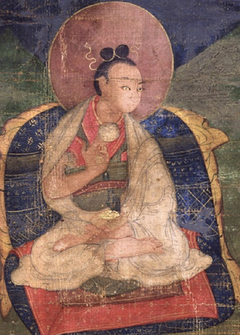White Torma Offering
༁ྃ༔ གནམ་ཆོས་ཐུགས་ཀྱི་གཏེར་ཁ་གུ་རུ་ཞི་བའི་སྐོར་ལས༔ དཀར་གཏོར་བཞུགས་སོ༔
Offering of the White Torma
from the Namchö Treasure Revelation’s Cycle of the Peaceful Guru
revealed by Tertön Mingyur Dorje
གུ་རུ་དྷེ་ཝ་དྷཱ་ཀི་ནཱི་ཧཱུཾ༔
Guru deva ḍākinī hūṃ
Bless the torma with:
ཨོཾ་ཨ་ཀཱ་རོ་མུ་ཁཾ་སརྦ་དྷརྨ་ནཱཾ་ཨཱ་དྱ་ནུ་ཏྤནྣ་ཏྭ་ཏ་ཨོཾ་ཨཱཿཧཱུྃ་ཕཊ་སྭཱ་ཧཱ། བྱིན་གྱིས་བརླབ་ལ༔
om akaro mukham sarwa dharmanam adyanutpanna tota om ah hung pé soha
oṃ akāro mukhaṃ sarvadharmānām ādyanutpannatvāt oṃ āḥ hūṃ phaṭ svāhā
ཧཱུཾ༔ སློབ་དཔོན་ཆེན་པོ་པདྨ་འབྱུང་གནས་ཀྱིས༔
hung, lobpön chenpo pema jungné kyi
Hūṃ. Those who keep samaya with and adhere to the commands of
བཀའ་དང་དམ་ཚིག་ལ་ནི་བཞག་པོ་ཡི༔
ka dang damtsik la ni zhakpo yi
The great master Padmasambhava:
དཔལ་ཆེན་མགོན་པོ་བདུན་ཅུ་རྩ་གཉིས་དང་༔
palchen gönpo dünchu tsa nyi dang
The seventy-two great and glorious Gönpos,
ཕྱི་ནང་གསང་བའི་ལྷ་སྲིན་སྡེ་བརྒྱད་དང༔
chi nang sangwé lhasin dé gyé dang
The eight classes of gods and spirits – outer, inner, and secret,
དགེ་བསྙེན་དྲེགས་པའི་སྡེ་དཔོན་སུམ་ཅུ་དང་༔
genyen drekpé depön sumchu dang
The thirty commanders of the haughty Genyen,
སྔགས་བདག་དྲེགས་ཆེན་བཅོ་བརྒྱད་འཁོར་བཅས་དང་༔
ngak dak drek chen chobgyé khor ché dang
The eighteen great and haughty ones, owners of mantra, together with their entourages,
ཡུལ་ཆེན་ཉི་ཤུ་རྩ་བཞིའི་ཞིང་སྐྱོང་དང་༔
yul chen nyishu tsa zhi zhingkyong dang
The kṣetrapālas of the twenty-four lands,
གནས་ཀྱི་མཁའ་འགྲོ་སུམ་ཅུ་རྩ་གཉིས་དང་༔
né kyi khandro sumchu tsa nyi dang
The ḍākinīs of the thirty-two places,
གངས་ཅན་བོད་ཀྱི་བརྟན་མ་བཅུ་གཉིས་དང་༔
gangchen bö kyi tenma chunyi dang
The Twelve Tenma of the snowy land of Tibet,
སྐྱོང་མ་དང་ནི་ཡ་མ་བཅུ་གཉིས་དང་༔
kyongma dang ni yama chunyi dang
The Kyongma goddesses, and the Twelve Yamas,
དགེ་བསྙེན་ཆེན་པོ་ཉི་ཤུ་རྩ་གཅིག་དང་༔
genyen chenpo nyishu tsa chik dang
The twenty-one great Genyen,
ཆོས་རྒྱལ་རྗེ་ཡི་མགུལ་ལྷ་བཅུ་གསུམ་དང་༔
chögyal jé yi gullha chusum dang
The Dharmarāja, lord over the thirteen Gül Lha,
སྲིད་པ་འདི་ཉིད་ཆགས་པའི་ལྷ་དགུ་དང་༔
sipa di nyi chakpé lha gu dang
The nine gods of desire within this realm,
སྐྱོབ་པར་བྱེད་པའི་ལྷ་ལྔ་བསྟེན་པའི་ལྷ༔
kyobpar jepé lha nga tenpé lha
The five gods of protection, the reliable gods,
ཁྱད་པར་ཡུལ་ཕྱོགས་འདི་རུ་གནས་པ་ཡི༔
khyepar yul chok diru nepa yi
And, in particular to the spirits and gods of mountains, both near and far,
ཕ་རི་ཚུ་རི་གཡས་རི་གཡོན་རི་དང་༔
pari tsuri yéri yönri dang
Those dwelling in the mountains and hills to the right, left, in front and behind,
མདུན་རི་རྒྱབ་རི་མཚོར་ས་བྲང་ཁང་འདིར༔
dünri gyabri tsor sa drang khang dir
on the earth and in local lakes –
གནས་པའི་ས་བདག་ཀླུ་གཉན་གཞི་བདག་རྣམས་༔
nepé sadak lunyen zhidak nam
Land owners, nāgas, mountain gods, and regional gods all,
འདིར་གཤེགས་བརྒྱན་པའི་གཏོར་མ་འདི་བཞེས་ལ༔
dir shek gyenpé torma di zhé la
Please come here and accept this decorated torma.
བདག་ཅག་དཔོན་སློབ་འཁོར་དང་བཅས་པ་ཡི༔
dakchak pönlob khor dang chepa yi
Afford us, master, disciples and entourage,
ཁ་འཛིན་སྡོང་གྲོགས་མེལ་ཚེ་སྐྱེལ་བསུ་དང་༔
kha dzin dongdrok meltsé kyel su dang
Your assistance, and companionship, keep a watch over us, welcome us,
མཐུན་རྐྱེན་རོག་དན་སྒྲུབས་ལ་འགལ་རྐྱེན་སོལ༔
tünkyen rok den drub la galkyen sol
Be our friend, and provide us with conducive circumstances whilst removing adversity –
བཅོལ་བའི་ཕྲིན་ལས་མྱུར་དུ་འགྲུབ་པར་མཛོད༔
cholwé trinlé nyurdu drubpar dzö
Swiftly fulfil the activity we have entrusted to you.
ཨོཾ་སརྦ་ལོ་ཀ་པཱ་ལ་ཨི་དཾ་བ་ལིཾ་ཏ་ཁ་ཁ་ཁཱ་ཧི་ཁཱ་ཧི༔
om sarwa lokapala idam balingta kha kha khahi khahi
oṃ sarva lokapāla idam baliṃ te kha kha khāhi khāhi
ས་མ་ཡ༔ རྒྱ་རྒྱ་རྒྱ་༔ གུ་ཧྱ་ཁ་ཐཾ༔ ཤ་མཧྱ༔
Samaya. Gya gya gya. Guhya khatam. Shamahya.
ཅེས་པ་འདི་སྤྲུལ་སྐུ་མི་འགྱུར་རྡོ་རྗེ་དགུང་ལོ་བཅུ་གསུམ་པ་བྱ་ལོ་ཆུ་སྟོད་ཟླ་བའི་ཚེས་བརྒྱད་ལ་ཨོ་རྒྱན་རིན་པོ་ཆེས་དངོས་སུ་གསུངས་སོ།།
Orgyen Rinpoche spoke these words directly to Tulku Mingyur Dorje, who was thirteen years old at the time, on the eighth day of the āṣāḍha month in the year of the Bird.
| Translated by Sean Price, 2022.
Source: mi 'gyur rdo rje, karma chags med. "dkar gtor" in gnam chos/. 13 vols. Paro Kyichu, Bhutan: Dilgo Khyentsey Rinpoche, 1983. (BDRC W21578) Vol. 2: 299–300
Version: 1.0-20220901
